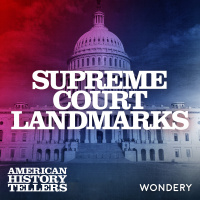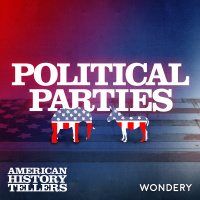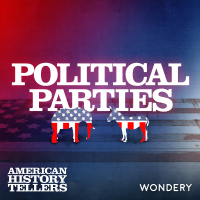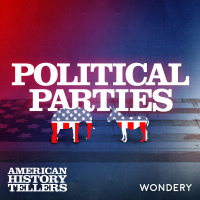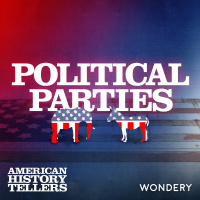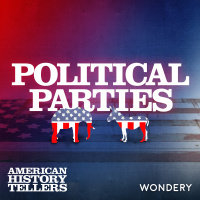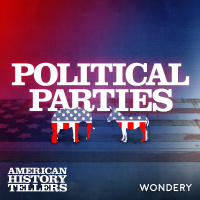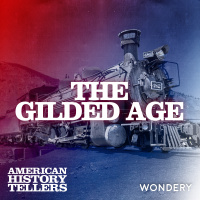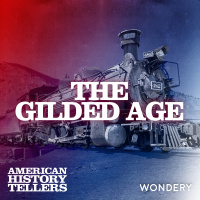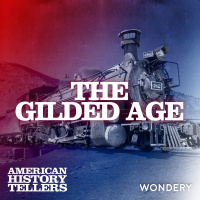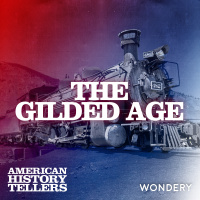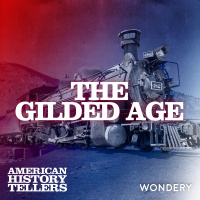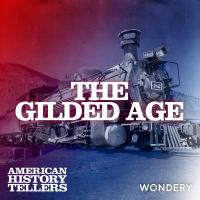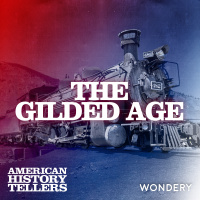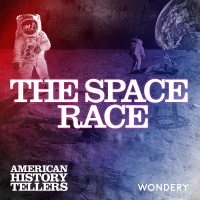Sinopsis
The words you speak. The ideas you share. The freedoms you defend. Every part of your life can be traced to our shared history, but how well do you really know the stories that made America? We’ll take you to the events, the times and the people that shaped our nation and Americans. And we’ll show you how our history affected them, their families and affects you today. Hosted by Lindsay Graham. From Wondery, the network behind Tides Of History, History Unplugged, Fall Of Rome and Dirty John.
Episodios
-
Supreme Court Landmarks | The Predicament of John Marshall | 1
21/10/2020 Duración: 35minAfter the War of Independence, the new American government created the Supreme Court to be have the final word on disputes that the states couldn’t settle. But at first, the Court was anything but Supreme.For nearly a decade, Congress and the President held the real power. In practice the Supreme Court was weak, ineffectual and disorganized – a post so unappealing that many men turned down nominations to serve on its bench. All that would change with the appointment of Chief Justice John Marshall and the arrival of a case called Marbury v. Madison — a political drama that would embroil the new President Thomas Jefferson, outgoing president John Adams, the U.S. Congress, and even the Chief Justice himself.Listen to new episodes 1 week early and to all episodes ad free with Wondery+. Join Wondery+ for exclusives, binges, early access, and ad free listening. Available in the Wondery App. hereSupport us by supporting our sponsors!See Privacy Policy at https://art19.com/privacy and California Privacy Notice a
-
Encore: Political Parties | The Reagan Revolution | 6
14/10/2020 Duración: 49minThe year 1968 marked a watershed in American politics. Anti-war protests were roiling the country. Civil rights leader Martin Luther King Jr. was shot dead in Memphis. Democratic President Lyndon Johnson’s approval rating was plummeting. The assassination of Democratic presidential hopeful Robert Kennedy would throw the party into disarray, toppling the New Deal coalition built by Franklin Delano Roosevelt two generations earlier and leading to a conservative surge.The political sea change would drive Republican nominee Richard Nixon to the White House in 1968. And it would eventually elect a former actor and California governor who would change the face of American politics in ways that are still being felt to this day. His name was Ronald Reagan.Listen ad-free on Wondery+ hereSupport us by supporting our sponsors!See Privacy Policy at https://art19.com/privacy and California Privacy Notice at https://art19.com/privacy#do-not-sell-my-info.
-
Encore: Political Parties | The New Deal Coalition | 5
07/10/2020 Duración: 45minThe 1929 stock market crash saw 14 billion dollars vanish in a matter of hours — and with it, the Republican party’s decades-long grip on American politics. As Americans lost their livelihoods, they turned to President Herbert Hoover for relief. But the self-made man who had so successfully reversed his own fortunes seemed unable to do the same for his country. With discontent growing, Hoover turned on World War veterans demanding early bonus payouts to support their families. It would prove the last straw for many Americans.The landslide election of 1932 would mark a profound realignment in U.S. politics, bringing urban centers under Democratic control for the first time in the party’s history. And it would propel into the White House Franklin Delano Roosevelt, whose sweeping New Deal would permanently transform the American political landscape.Support this show by supporting our sponsors!See Privacy Policy at https://art19.com/privacy and California Privacy Notice at https://art19.com/privacy#do-not-sell-my
-
Encore: Political Parties | The Golden Age of the GOP | 4
30/09/2020 Duración: 47minAs the Civil War came to a close, the government set its sights once again on the future of the United States. Working closely with a Republican President, the Republican Congress expected a swift and peaceful road to Reconstruction. But then, a mere four weeks into his second term, Lincoln was assassinated, leaving the country in the hands of Andrew Johnson, a Southern Democrat who had personally owned slaves just three years before.While Johnson’s unwavering commitment to states rights cultivated a fraught relationship with his Congress, the tumult would ultimately be short-lived. After just four years of a Democratic president, America’s Grand Old Party would ascend to power—and hold it—for over 70 years.Listen ad-free on Wondery+ hereSupport us by supporting our sponsors!See Privacy Policy at https://art19.com/privacy and California Privacy Notice at https://art19.com/privacy#do-not-sell-my-info.
-
Encore: Political Parties | The Turbulent 1850s | 3
23/09/2020 Duración: 43minThe United States won the The Mexican–American War in the 1840s, and with it vast new stretches of western land. But in the 1850s, the question of what to do with this land – and whether to allow slavery in the new territories or not – became a redning issue for politicians of all stripes.While the Whig Party collapsed over the issue, Democrats split into Northern and Southern factions, and a new Republican Party tried to bind the Union with an appeal to old Jeffersonian values. But in the houses of Congress and across the nation, negotiations fail, compromise is abandoned; and the issue of slavery will overshadow all else, leading to Civil War.Support us by supporting our sponsors!See Privacy Policy at https://art19.com/privacy and California Privacy Notice at https://art19.com/privacy#do-not-sell-my-info.
-
Encore: Political Parties | Jacksonian Democracy | 2
16/09/2020 Duración: 47minAndrew Jackson lost the 1824 presidential election to John Quincy Adams through what some called a “corrupt bargain” in the House of Representatives. The maneuver was masterminded by hot-headed but politically savvy Henry Clay, who with Adams, announced their intent for far-reaching new federal programs. Fierce opposition to these policies united pro-Jackson supporters who formed a new party, the Democrats, to rally around their hero and elect him to president in 1828.But while Adams was defeated, Henry Clay had no intention of leaving the fight. He helped lead a new party which gathered together anti-Jackson, fiscal conservatives, and pro-states rights factions. The rise of Clay’s new Whig party seemed unstoppable–they captured both houses of Congress and the presidency–until, on April 4, 1841, president William Henry Harrison died in office and gave John Tyler the power of the veto.Support this show by supporting our sponsors!See Privacy Policy at https://art19.com/privacy and California Privacy Notice at h
-
Encore: Political Parties | A Tale of Two Parties | 1
09/09/2020 Duración: 45minIn the earliest days of the United States, there was no such thing as an organized political party. George Washington, elected twice to the presidency unanimously in the Electoral College, warned the new nation against political factions, writing that organized parties would become, “potent engines, by which cunning, ambitious, and unprincipled men subvert the power of the people.”But immediately after Washington vacated the Presidency, factions did spring up and bitter personal rivalries began to shape the nation. The two first political parties–the Federalists and the Republicans–had very different views of what America should become, and were led by very different men: Alexander Hamilton and Thomas Jefferson.Listen ad free with Wondery+. Join Wondery+ for exclusives, binges, early access, and ad free listening. Available in the Wondery App. https://wondery.app.link/historytellersSupport us by supporting our sponsors!See Privacy Policy at https://art19.com/privacy and California Privacy Notice at https://ar
-
The Gilded Age | What America Failed to Learn from the Gilded Age | 7
02/09/2020 Duración: 38minThroughout our series, corporate giants and their exploitation of workers was disturbing evidence of capitalism run amok. That greed and disregard for the working class defined the Gilded Age. But the problems of that era haven’t disappeared. The economic disparities that were forged in the Gilded Age are still affecting our country. And monolithic companies like Facebook and Apple continue to grow, leaving a burning question of whether big tech has too much power. Today, Lindsay speaks with Tim Wu, a Columbia law professor and author of “The Curse of Bigness: Antitrust in the New Gilded Age,” about the economic and social changes that took place then, and how they set the stage for modern America. For more on Tim Wu: http://www.timwu.org/about.htmlListen ad-free on Wondery+ hereSupport us by supporting our sponsors!See Privacy Policy at https://art19.com/privacy and California Privacy Notice at https://art19.com/privacy#do-not-sell-my-info.
-
The Gilded Age | Cross of Gold | 6
26/08/2020 Duración: 41minIn the spring of 1894, hundreds of unemployed workers trudged through rain and snow on a 400-mile trek from Ohio to the nation’s capital. They joined armies of jobless men from all across the country to march on Washington, fed up with the government’s inaction in the face of the crippling Panic of 1893.The century’s most punishing economic depression unleashed fierce political turmoil. A bitter debate over the gold standard consumed Americans nationwide. With the Treasury on the brink of collapse, President Cleveland made the desperate and controversial decision to turn to the nation’s top banker for a bailout.The conflict over currency culminated in the emotional election of 1896, which pitted William McKinley against the charismatic reformer William Jennings Bryan, who electrified voters with his sensational “Cross of Gold” speech.Listen ad-free on Wondery+ hereSee Privacy Policy at https://art19.com/privacy and California Privacy Notice at https://art19.com/privacy#do-not-sell-my-info.
-
The Gilded Age | Workers Revolt! | 5
19/08/2020 Duración: 38minAs the century came to a close, labor unrest reached explosive new heights. Industrial expansion made businessmen and bankers rich. But workers faced low wages, long hours, and dangerous conditions. They sought strength in numbers, fighting for basic rights against the power of big business—and often faced violent pushback.In May 1886, a bomb exploded at a peaceful labor protest in Chicago’s Haymarket Square. Police fired their guns into the crowds. Panic engulfed the city. And the nation’s most powerful labor union suffered a devastating blow. In Homestead, Pennsylvania, steelworkers waged a bloody battle against private security forces. And in Pullman, Illinois, railroad workers laid down their tools, sparking a nationwide railroad shutdown—one that President Grover Cleveland would crush with brutal force.Listen ad-free on Wondery+ hereSee Privacy Policy at https://art19.com/privacy and California Privacy Notice at https://art19.com/privacy#do-not-sell-my-info.
-
The Gilded Age | Exclusion | 4
12/08/2020 Duración: 43minAmid the glamor and growth of the Gilded Age, racism and anti-immigrant hostility swept the nation. With the end of Reconstruction, white communities across the South stripped African Americans of their hard-won political rights and economic gains. But a new generation of activists fought the growing wave of discrimination and violence. Booker T. Washington championed black education, and journalist Ida B. Wells waged a fierce campaign against lynching.In the West, labor groups fueled anti-Chinese resentment, building support for the first major federal law limiting immigration. In the mid-1880s, white mobs from Wyoming to Washington descended on Chinese neighborhoods, stoking hysteria and casting immigrants out of their homes.Listen ad-free on Wondery+ hereSupport us by supporting our sponsors!See Privacy Policy at https://art19.com/privacy and California Privacy Notice at https://art19.com/privacy#do-not-sell-my-info.
-
The Gilded Age | How the Other Half Lives | 3
05/08/2020 Duración: 40minIn the spring of 1883, Mrs. Alva Vanderbilt threw the grandest party New York had ever seen, claiming her spot at the top of the city’s social hierarchy. The Gilded Age drove feverish growth in America’s cities. Populations swelled. Skyscrapers and steel bridges soared above city skylines. And the new economic elite poured their outrageous fortunes into magnificent mansions and lavish balls.But there were two sides to Gilded Age cities. Less than a mile away from Manhattan’s elegant brownstones, the poor eked out a living in sooty factories and crowded slums. In the 1880s and 1890s, reformers rose up to challenge inequality—galvanizing workers and exposing the dark underbelly of urban growth.Listen ad-free on Wondery+ hereSupport us by supporting our sponsors!See Privacy Policy at https://art19.com/privacy and California Privacy Notice at https://art19.com/privacy#do-not-sell-my-info.
-
The Gilded Age | Rise of the Robber Barons | 2
29/07/2020 Duración: 41minIn the 1870s and 1880s, businessmen clawed their way to the top of the new industrial economy, accumulating staggering fortunes. Oil tycoon John D. Rockefeller ruthlessly eliminated his rivals one by one, seizing control over the nation’s refineries. Steel magnate Andrew Carnegie revolutionized the industry with his relentless drive to cut costs. And banker J. P. Morgan conquered Wall Street, commanding vast amounts of capital to consolidate corporations.But the concentration of wealth and power had dire consequences for ordinary Americans, and in the summer of 1877 frustrated workers fought back. They blocked freight trains, shut down major rail lines and crippled the nation’s economy.The strike spread like wildfire and sparked deadly violence.Listen ad-free on Wondery+ hereSupport us by supporting our sponsors!See Privacy Policy at https://art19.com/privacy and California Privacy Notice at https://art19.com/privacy#do-not-sell-my-info.
-
The Gilded Age | Carnival of Corruption | 1
22/07/2020 Duración: 38minIn 1869, America connected its vast, sprawling territory with its most ambitious project to date: the transcontinental railroad. The country had just emerged from the ashes of the Civil War, and the railroad galvanized people from coast to coast, offering opportunity and promise. But corruption soon cast a pall over the nation.Scandal after scandal tainted the presidency of Ulysses S. Grant. A pair of unscrupulous investors schemed to drive up the price of gold, unleashing chaos from Wall Street to the nation’s farms. Prominent congressmen funneled public money into a sham corporation to profit off the railroad. And government agents conspired with whiskey distillers to defraud the Treasury of millions.It was the dawn of the Gilded Age—an era of dramatic material progress and sordid greed and corruption.Listen ad-free on Wondery+ hereSupport us by supporting our sponsors!See Privacy Policy at https://art19.com/privacy and California Privacy Notice at https://art19.com/privacy#do-not-sell-my-info.
-
Stonewall | Eric Marcus Remembers the Voices of Stonewall | 5
15/07/2020 Duración: 39minWhen the events of Stonewall happened in 1969, Eric Marcus was just a boy away at a New Jersey summer camp. Nearly 20 years later, he would document the voices of revolutionary LGBTQ activists like Marsha P. Johnson, Sylvia Rivera and Frank Kameny for his book, “Making Gay History: The Half-Century Fight for Lesbian and Gay Equal Rights.” While his work started out as a printed oral history, Marcus knew that taping those interviews would “one day have value beyond my book.” And he was right. Many of those interviews can be heard on the Making Gay History podcast, which he founded and hosts. Today, Marcus talks about his conversations with people who shaped the early LGBTQ movement. He’ll also share what people who were patrons of the Stonewall Inn told him about their time there. Listen ad-free on Wondery+ hereSupport us by supporting our sponsors!See Privacy Policy at https://art19.com/privacy and California Privacy Notice at https://art19.com/privacy#do-not-sell-my-info.
-
Stonewall | Pride | 4
08/07/2020 Duración: 46minAfter a late-night police raid on the Stonewall Inn in June 1969, the LGBTQ community fought back in the streets of Greenwich Village. Suddenly, the LGBTQ rights movement found itself catapulted onto the national stage. But questions of how radical an approach to take would pit young activists against the pioneers of the 1950s and 1960s. Even with the formation of new organizations like the Gay Liberation Front and the Gay Activists Alliance, questions emerged. Would it be better to take part in the political process? Or to stage confrontational “zaps?”These new groups would soon be engulfed by in-fighting over goals, strategy, membership, and how the LGTBQ rights movement fit into the larger landscape of radical activism. Meanwhile, Sylvia Rivera and Marsha P. Johnson would form their own group – one that would speak directly to issues facing unhoused people, and the trans community in New York city.Listen ad-free on Wondery+ hereSupport us by supporting our sponsors!See Privacy Policy at https://
-
Stonewall | Why Don’t You Do Something? | 3
01/07/2020 Duración: 38minResistance at restaurants in San Francisco and Philadelphia showcased the building tension as trans activists challenged long-standing policies of discrimination. But leading gay rights groups continued to stress a calm, non-confrontational approach to reform.That all changed in the early morning hours of June 28, 1969, when police raided the Stonewall Inn. For police, it was just another raid, but this time would be different: the Stonewall’s patrons would fight back. The clashes on Christopher Street would become an uprising against police oppression with long-lasting reverberations for the LGBTQ rights movement.Listen ad-free on Wondery+ hereSupport us by supporting our sponsors!See Privacy Policy at https://art19.com/privacy and California Privacy Notice at https://art19.com/privacy#do-not-sell-my-info.
-
Stonewall | Turbulence | 2
24/06/2020 Duración: 43minAs the 1960s dawned, LGBTQ activists began to voice frustration with the gradual approach to civil rights advocated by groups like the Mattachine Society. If LGBTQ people wanted to make real progress, they concluded, they would need to take direct action — starting with tactics shared with the Black civil rights movement. Through protests and sit-ins in places like New York, Washington DC, and San Francisco, LGBTQ activists started agitating for greater rights. They would tackle employment discrimination along with the widespread issues of police harassment, abuse, and entrapment, which targeted LGBTQ people nationwide. But as white gay activists pushed for acceptance by a white, middle-class American majority, transgender activists and people color faced even greater challenges related to their race and gender identity. They would respond by forging their own communities and strategies to protect themselves from harassment and violence. Listen ad-free on Wondery+ hereSupport us by supporting o
-
Stonewall | Evolutionary, Not Revolutionary | 1
17/06/2020 Duración: 38minIn the summer of 1969, a police raid on the Stonewall Inn sparked a riot on the streets of Greenwich Village. The protest marked a turning point in the gay rights movement. But the famed resistance in New York capped a movement that had been building for nearly two decades in America, as LGBTQ people mobilized to fight widespread and pervasive discrimination.In the years following World War II, members of the LGBTQ community faced broad discrimination — from strict laws that oppressed them, churches that declared their very existence sinful, and a government that demonized them. They would push back against the American Psychological Association, the FBI and finally, the courts. Slowly, LGBTQ activism would emerge from out of the closet and onto the American scene.This series follows strands of the gay rights movement in America from 1950 until 1970. But it’s just the beginning of a story about a fight for social and political equality — a battle that’s still being fought today.Support us by supporting our sp
-
Encore: The Space Race | Photo Finish | 4
10/06/2020 Duración: 39minJFK said that nothing in the 1960s was "...more impressive to mankind, or more important for the long-range exploration of space..." than getting a man to the moon and back safely. As the Apollo 11 flight neared, the entire nation waited, enraptured. But back in the USSR, the Soviets were also making strides. Though the contest with the Soviets for technological superiority had always been a race, it was now a literal one - a U.S. manned spacecraft was about to chase down a Soviet robotic vessel. Listen ad-free on Wondery+ hereSupport us by supporting our sponsors!See Privacy Policy at https://art19.com/privacy and California Privacy Notice at https://art19.com/privacy#do-not-sell-my-info.

